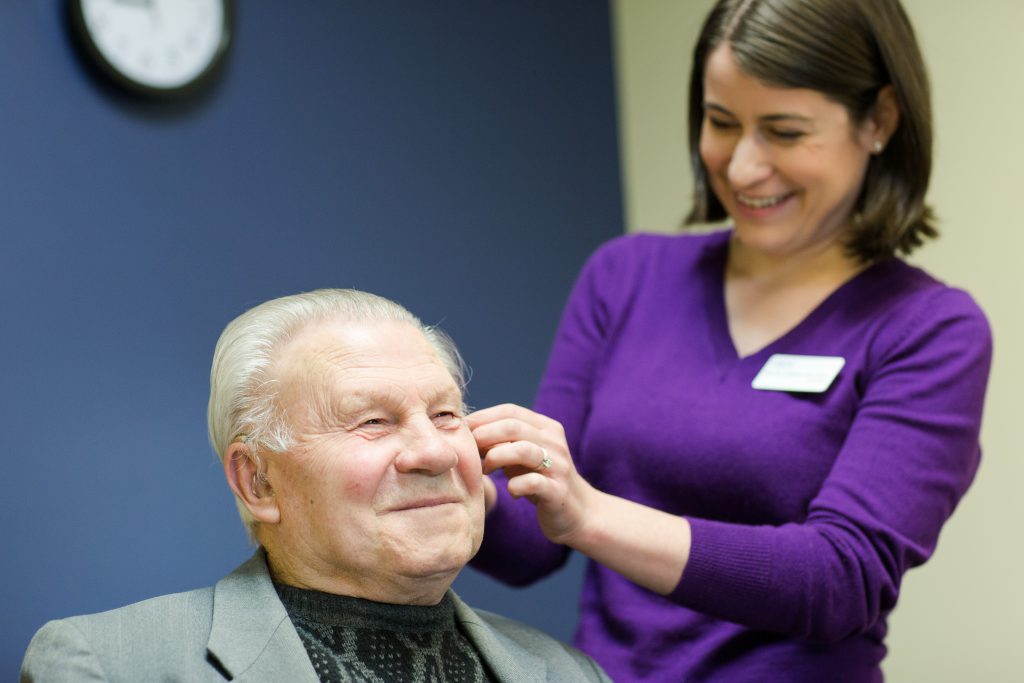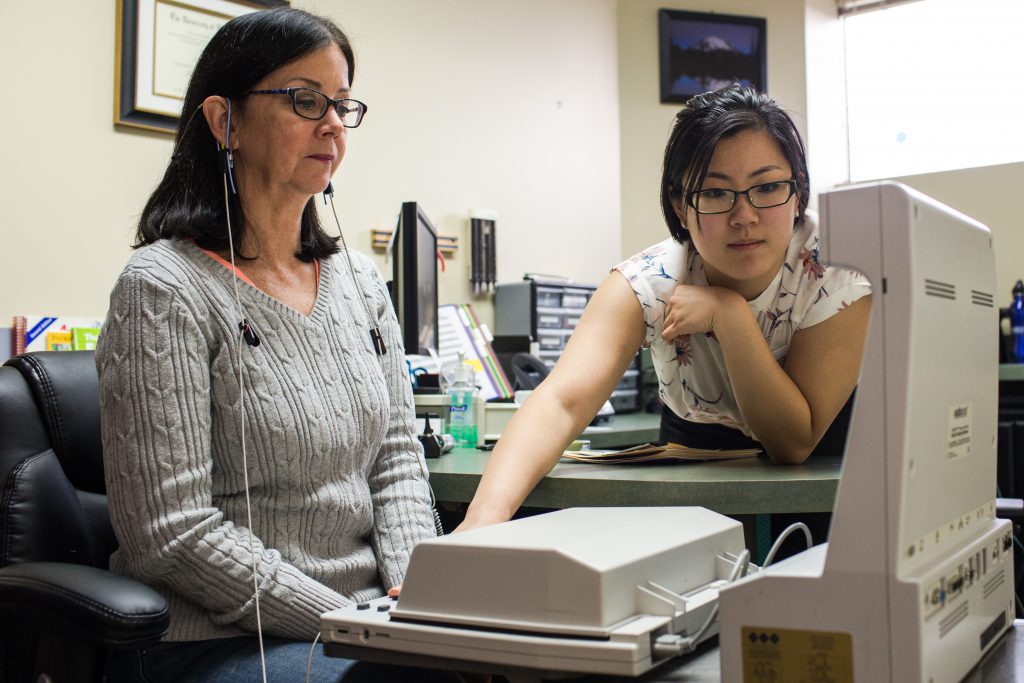Audiological Evaluations
Our recommended path is to start with a comprehensive hearing test. Our knowledgeable front desk staff will help you get set up a client profile, get a referral from your primary care doctor if necessary, and schedule you for your appointment. You’ll see a Doctor of Audiology who will take your history and perform a comprehensive hearing evaluation. This includes looking at your ears, doing a tone test (measuring how you hear at various pitches), and assessing your ability to understand words in quiet or in background noise. This will give us a baseline of how you’re hearing now. We are happy to send a copy of the written report to you or anyone else on your care team.
Our Audiologists have backgrounds at major medical centers and are trained to work with pediatric clients, geriatric clients, as well as clients with multiple involvements or developmental delays. If you or someone you know requires special support, contact us and we will be happy to work with you.
Ready to set up an appointment? Contact us today.
Hearing Aid Consultations
If a hearing aid would be appropriate for your hearing loss, we’ll perform a hearing aid consultation. We’ll discuss your listening priorities—who, what, and where do you want to hear better?—and then tailor our recommendations to your needs and preferences. We believe client education is essential, and we are happy to answer questions or discuss myths about hearing loss and hearing aids.
OUR HEARING AIDS
We provide hearing aids across all the major manufacturers and across all technology levels. They come with a 60 day trial period. All purchases help support programming at HSDC.
Those who have had their hearing tested elsewhere are welcome to bring in their latest audiogram. Note: according to Washington State law, a hearing test must be performed within six months of a hearing aid fitting to be considered valid.
As a nonprofit, we are able to offer access to hearing aids for all income levels through our community partners. We believe that everyone should have access to sound if they need it.
Hearing Aid Fitting & Service

Once you make your decision, we schedule a hearing aid fitting. We will perform best practices, as recommended by the American Speech-Language Hearing Association (ASHA) and the American Academy of Audiology, including real-ear measures to make sure your hearing aids are calibrated to your hearing loss and your ear size and shape. We set aside dedicated time to make sure you know how to take care of and maintain your hearing aids.
Within the first few days, we’ll follow-up with you to see if you have any immediate questions.
We schedule a recheck, typically in about two weeks, to check back in with you after you’ve had a chance to experience the hearing aids in your day-to-day life. We encourage you to take notes as you get used to new sounds, so we can continue to fine-tune them. Hearing aids are not like glasses; they require adjustments over time!
After your hearing aids are set to your satisfaction, we’ll plan to see you back semiannually for a deep clean of your hearing aids. This is also a great opportunity to ask any questions that may have come up over the last 6 months. Over time, should your hearing loss or listening needs change, we will continue to make adjustments to your hearing aids.
Our services are open by client appointment only Monday through Thursday 8:30am-5:00pm — NO WALK INs. We are currently offering both Telehealth (i.e., Zoom) and in-person appointments.
Assistive Communication Technology (ACT) and Workplace Accommodation Evaluations
The HSDC advocacy services team loans out free assistive listening devices and listening systems to local organizations that serve deaf and Hard-of-Hearing community members. Organizations can borrow equipment to fit their needs. HSDC has equipment that can be used in one on one listening situations to small lecture environments. Our knowledgeable advocacy team trains and demonstrates different assistive listening devices and equipment.
Information and resources for assistive technologies
Find information and training on technology such as amplified phones, videophones, Assistive Listening Devices (ALDs), smartphones, apps, and visual/vibrating alert systems to improve their independence. You can contact us about those technologies as well as learn about applying for equipment through the state Telecommunication Equipment Distribution program.
We have resources on communication technology including information on low-cost hearing aids, financial assistance programs, special phones, emergency alerting devices, communication strategies, state relay services, options for hard of hearing children, educational/community access, virtual access, captioning and interpreting.
Please note: to schedule a Work Accommodation Evaluation, we require an intake form. Please contact us today to see if a work accommodation evaluation would be appropriate for you!
